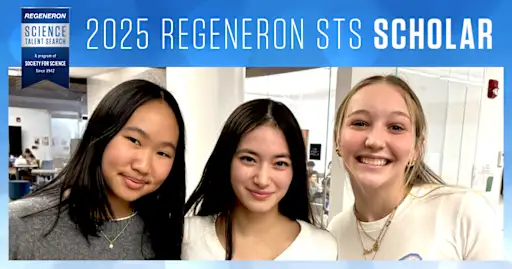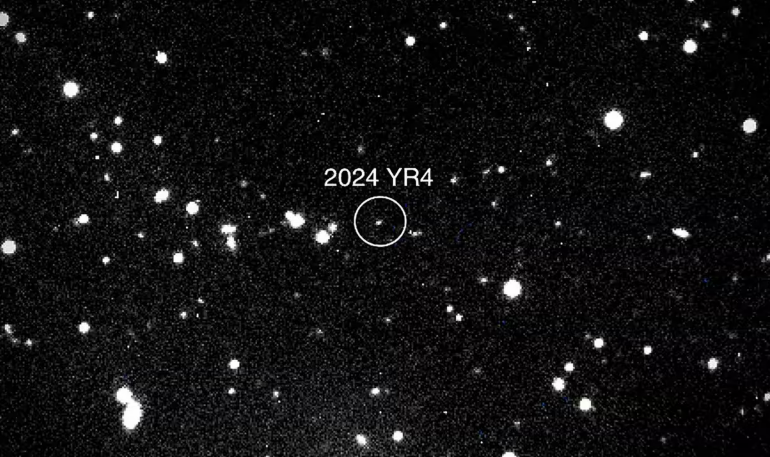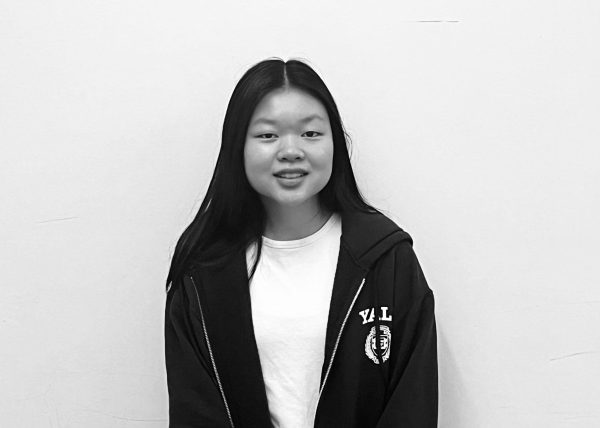The Greeley Science Research Program has long demonstrated academic excellence and scientific rigor. Led by Dr. Argiros, Ms. Ma, and Mr. Zupan, the program spans three years, providing students with the opportunity to engage in novel research across a variety of scientific fields. Upon entering the classroom, students are greeted by a prominent banner proudly displaying: Regeneron Science Talent Search 2025 Scholar School.
As the nation’s oldest and most prestigious science and math competition for high school seniors, the Regeneron Science Talent Search annually highlights the achievements of students conducting groundbreaking research across various scientific disciplines. This year, the competition saw a record number of applicants, with 300 scholars emerging as top contenders from nearly 2,500 entrants spanning 795 high schools across 48 states and 14 other countries. Among these exceptional young scientists are three students from Greeley: Meadow Z., Sara J., and Nora M.
Meadow’s project, “Leveraging Lipid Nanoparticle Technology for the Targeted Delivery of mRNA to Germinal Center B Cells,” explores an advanced method for delivering mRNA to specific immune cells. Her work uses lipid nanoparticles as delivery vehicles and bispecific antibodies as linkers to precisely target germinal center B cells, a key subset of immune cells involved in adaptive immunity. Understanding germinal center biology is necessary not only for the sake of understanding our immune system but also for developing potential treatments for B cell cancers.
Sara’s research, titled “Toppling the Domino Effect: A Novel Approach to Predicting Systemic Banking Distress Using Interacting Networks Analysis,” focuses on developing a computational model to predict banking system failures during times of crisis. Inspired by the 2008 financial collapse, Sara designed a model to simulate the domino effect that occurs when one bank failure leads to successive failures across the financial system. Her model serves two primary applications: first, it enables policymakers to assess the severity of an impending crisis and implement preventative measures; and second, it acts as an early warning system to signal when a crisis is likely to occur. By mitigating and preventing banking crises, her work aims to relieve economic burdens and decrease financial instability.
Nora’s project, “Evaluation of the Performance of Wave Attenuation Devices (WADs) at a Coastal Marsh Shoreline Using a Smartphone-Based Wave Intensity Sensor (WILSON),” focuses on developing a novel device to measure boat wakes and their impact on shorelines. Coastal erosion, particularly in marsh islands, disrupts carbon recycling and marine habitats such as estuaries and reefs. The influx of recreational boating near vulnerable fisheries exacerbates this problem, particularly in high-income coastal communities. To address this, Nora designed an innovative tool, called WILSON, using her iPhone to measure boat wakes and the effectiveness of breakwaters. Her research highlights the importance of protecting fragile ecosystems and finding accessible, cost-effective solutions for environmental disruptions.
Each scholar reflected on the most challenging aspect of their research journey, unanimously agreeing that the greatest deterrent was not formulating their research questions but securing the resources and guidance needed to conduct their projects. Greeley’s Science Research program is incredibly laborious and time-intensive, but one of the hardest challenges is finding a mentor—a process that can take months. Many students send upwards of 100 emails before receiving a single response from a willing mentor, making this initial step a significant barrier in the research process.
However, the difficulty of the journey made the achievement even more rewarding. Nora reflected on her experience, commenting, “[STS] is like the Olympics of research—it seemed so unattainable and out of reach. It was incredibly validating to see all of my hard work recognized and appreciated.” For Sara, the best part was being able to spark an interest in others, particularly, younger students: “I loved being able to share my journey, and I’m grateful to be part of theirs too.” Meadow reflects on the new relationships she has developed from research: “I am truly grateful for the people that I have met through science research, including my friends, Mr. Zupan, and, of course, my amazing mentor.”
For students interested in independent research, the scholars all emphasized the importance of passion. Without a genuine interest in the subject, the process can feel tedious, and that lack of enthusiasm will inevitably reflect in your work. Research is challenging by nature—it requires patience, resilience, and countless hours of dedication. There will be obstacles, whether it’s struggling to find a mentor, facing experimental setbacks, or revising a project for the hundredth time. But when you truly care about your topic, those challenges become part of the journey rather than roadblocks.
A huge congratulations to Meadow Z., Sara J., and Nora M. for being named 2025 Greeley Regeneron Science Talent Search Scholars— we can’t wait to see where your research will take you next!








